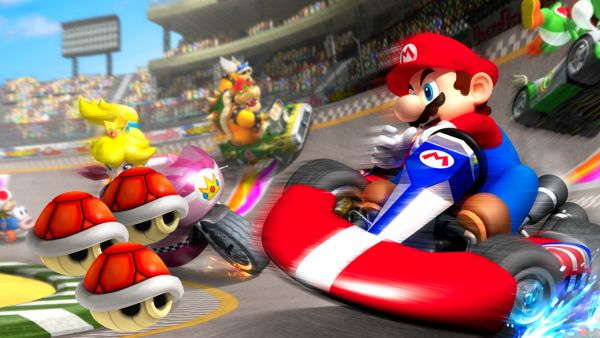The Value of Playing Games

The following article has been sponsored by a third party and does not necessariily represent the views and opinions of Casual Game Revolution.
There are still some parents, educators, and even elected officials who are very vocal advocates for limiting the amount of time allowed for playing video games. This is undoubtedly in the hope of preventing the player from turning into some socially inept misanthrope that looks like an extra from any of the Twilight films.
In truth, playing video games is not only entertaining, which is in itself a benefit and needed in order to be a “normal” person, they also teach life-skills, contribute to physical well-being, and help the gamer overcome nerves in real-world situations.
Critical Thinking
Problem solving and critical thinking are the crux of virtually every game that has ever existed. President and CEO of NCH Healthcare Systems, Dr. Alan Weiss, says, “Being immersed in a video game…can encourage creative solutions and adaptations [which] can then be applied to real life situations. The results can be surprisingly positive for individuals, communities, and society as a whole.” Video games expand on this by offering 3-D environments and immersive scenarios.
The block puzzle, one of the most common items in video games, for example, teaches the player how to manipulate objects. The skills used in solving the puzzles are applicable to everyday life in a variety of ways from loading a moving van, fitting an oversized desk through a standard door, or even efficiently stocking a fridge or freezer.
Braid is a good example of how the basic block puzzle enhances a variety of skills. Each “act” in the game builds on the previous one. The game provides little in the way of instructions for the new levels and changes in the game environment. The player must figure out how the game has changed, conquer increasingly difficult puzzles and discern how to manipulate both time and space in order to win.
Learning to Fail
Over the past few years, competition has become an almost forbidden word. The concept that losing, even in a sporting event, will result in some long lasting damage to a kid’s psyche has for some reason become a respected theory. In video games, as in life, sometimes you win and sometimes you lose. Video games do not issue “Nice Try” or “Participant” ribbons or badges.
In the early days, players were able to increase their health by picking up health-restoring objects. Today, many games require complex tasks to restore the characters’ health. Health points are often restored in a simulated, although compressed, time frame. The game Day Z has even taken the previously unheard of step of making the demise of game character permanent. While the first person shooters are most often thought of as a game that teaches the concepts of winning and losing, games like Mario Kart also teach us how to lose.
Learning to win and lose with class are important life skills. So is learning to respect your competition; a lesson that research shows to be a natural result of competition. Failing also provides an impetus for improvement, which goes back to the critical thinking and problem solving area. Leader boards provide a tool to measure achievements and improvements, as well as help players set goals.

Collaboration
In multi-player games, it is almost impossible to win without working with others. This is a key skill of those who are successful in the real world. Games help develop effective teamwork by recognizing one’s own strengths and weaknesses as well as learning how to utilize the strengths of others for the benefit of the team. Portal 2’s two-player mode requires that each player look at not only the puzzle, but develop a strategy that necessitates the involvement of the other player.
Run a Business
For those individuals that don’t play games, the concept that gameplay can improve your business sense and abilities is probably a bit strange. However, at the heart of many games are the concepts and skills needed to succeed in business.
Greg Dinkin is the author of four books including The Poker MBA, which notes that poker develops crucial business skills. These skills include decision-making, risk management and negotiation. According to Dinkin, playing games like poker “builds the muscles of strategic thinking and emotional intelligence. Because emotion, fatigue and human nature play a role, it creates an environment that tests you and develops your skills faster and more efficiently than anything else.”
Games also provide economic models that work in a real world manner. One of the most accurate business simulators around can be found in the massively multiplayer online role-playing game (MMORPG) Eve Online. In addition to the regular competition for fame and points, the game has a complex economic system. In fact, the economic aspects of the game are so complex that the developers have their own chief economist, Eyjolfur Guomundsson. He says the game, with its player led corporation and a fully functional market is a perfect business simulator. Guomundsson told BusinessWeek “We can learn from watching the market behavior within a confined world like Eve Online and learn about how price bubbles, for instance, are formed, and what triggers them. We can also see in terms of social interaction how people form groups, and what it is that makes people work together.”

Improve Your Health
SuperBetter is one of the games designed to improve a person’s well-being. Dr. Jane McGonigal, the inventor and cofounder of SuperBetter advocates for “games that are designed to improve real lives and solve real problems.” She worked with a team of doctors and researchers to help tackle issues like chronic pain, depression, and traumatic brain injury. The goal of the game is to build resilience which, according to SuperBetter, helps the player “build social, mental, and emotional resilience in the face of any illness, injury, or health goal. Building resilience…has been scientifically proven to improve health outcomes of all kinds.”
Physics, Typing and More
The list of real world tasks and talents that can be enhanced by video games is fairly limitless; fitness games truly are beneficial in the real world, Portal helps with the understanding of physics, Papers, Please simulates real world situational thinking and the need to make important decisions quickly, Phoenix Wright enhances the ability for critical thinking. Players can improve their keyboard skills with Typing of the Dead.
The real reason for playing any video game is for the entertainment, but improving various real world skills while killing zombies, finding treasure or building a galactic empire is just an added benefit.




